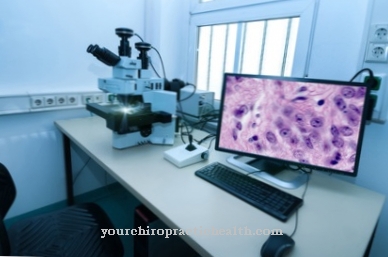The Psychoneuroimmunology, also as Psychoimmunology or abbreviated as PNI referred to, deals with three fields in an interdisciplinary manner. She would like to research the interactions between the immune system, nervous system and psyche. Since many questions are still unanswered, basic research is still being carried out in psychoneuroimmunology.
What is psychoneuroimmunology?

Since it was proven in 1974 that the immune system does not work independently of the nervous system, psychoneuroimmunology has become a popular research topic. The knowledge that the messenger substances released by the nervous system also have an effect on the immune system, and the messenger substances of the immune system also interact with the nervous system, allows conclusions to be drawn about the mechanisms of psychosomatic diseases.
The main question here is the effect of psychological changes on the functioning of the immune system and its ability to defend itself against infectious diseases. The question of how stress develops and why the body is more susceptible to infections when it is stressed can also be investigated using the methods of psychoneurology.
Treatments & therapies
In the pituitary gland, but also in the immune cells and the adrenal glands, messenger substances from the immune system as well as from the nervous system are active. The concentration of immune bodies decreases during stress; Chronic stress even leads to the release of immunosuppressants, i.e. substances that suppress the immune system.
In research on psychoneuroimmunology, further theses are currently being examined, which are suspected due to a connection between the immune system and the nervous system; Researchers assume that anxiety and depression also arise from interactions between the nervous system and the immune system. In depression, for example, the activity of the so-called "NK cells" is restricted. These are part of the immune system and are colloquially referred to as "killer cells" - they recognize tumor cells and destroy them. Even in anxiety disorders, there seems to be a connection between the nervous system and the immune system. A reduction in lymphocyte production can be seen here. However, in this area too, data acquisition is currently still at the basic research stage.
Psychoneuroimmunology not only deals with negative effects on the cooperation of the immune system and nervous system on the psyche, but also tries to find out which factors support a good cooperation of the control loops. The surprising finding: Just looking at funny videos can lead to the immune system producing increased levels of antibodies that can protect the person concerned from infections such as protect against a cold. The feeling of positive feelings has a positive effect on the immune system, just like social ties, optimism and a good self-esteem support the immune system in its work. For about 20 years, conventional medicine has abandoned the view that there is a strict dualism between body and soul.
The findings from psychoimmunology support the view that there are a large number of previously unexplored interactions between body and soul. For the holistic treatment of a disease, therefore, not only the organic cause must be combated, but the psychological well-being of the patient must also be the focus. Through its research, psychoneuroimmunology determines the appropriate methods for this, and directs our attention to the connections between the psyche and individual diseases.
Depression of the patient can often be observed after a heart attack. This could also be related to certain messenger substances that the nervous system releases. A cognitive restructuring is a sensible treatment here. The patient learns through e.g. behavioral therapy to convert the thoughts that arise from depression into positive thoughts and behaviors, which affects a holistic healing process.
You can find your medication here
➔ Medicines to strengthen the defense and immune systemDiagnosis & examination methods
The findings from psychoimmunology have found expression in the therapy method of "Mind-Body Medicine". The patients learn various relaxation exercises here, e.g. Breathing techniques or autogenic training. This enables them to fight against the reactions that stress has on their immune system.
Further therapy goals, which have emerged from the findings of psychoneuroimmunology, are to prevent stress from developing at all by establishing a balanced lifestyle. This allows the healing process to proceed better. Research on PNI also deals with self-healing powers and the mobilization of these through a positive attitude and a balanced psyche. In order to determine scientific evidence for self-healing powers and the effects of the psyche on the immune system, the interactions of the messenger substances on their molecular basis are examined in studies.
The body's various responses to stress - e.g. high blood pressure, palpitations, muscle tension - are brought into connection with organic and psychological mechanisms and finally proven experimentally in order to obtain reliable material with which tailor-made treatment methods can be designed. The experiments are based on cell cultures, whose reaction to the administration of various messenger substances is examined. Corresponding findings can also be obtained with animal experiments. In psychoimmunology, however, individual reactions of the human body are also of interest.
In addition to regular tests of the subjects' blood to determine the concentration of immune cells and immunosuppressants, the experimental set-up also provides for a survey on current living conditions. In this way, the mental health and stress level should be found out. For this purpose, the test subjects either receive appropriate questionnaires that they have to fill out regularly, or they are asked about their psychological well-being in discussions. In this way, the connection between certain reactions of the immune system and well-being can be determined.













.jpg)

.jpg)
.jpg)











.jpg)